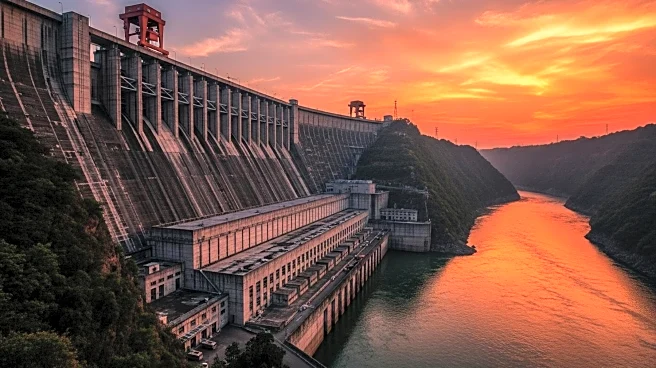What is the story about?
What's Happening?
India is concerned about China's plan to build a mega-dam in Tibet, which could significantly reduce water flow on a major river during the dry season. The Indian government is fast-tracking its own dam project to mitigate potential impacts. The Chinese dam, announced in December, is expected to be the world's largest hydropower dam and could allow China to divert substantial water volumes, affecting downstream regions in India. India is considering building the Upper Siang Multipurpose Storage Dam to counteract these effects, with plans to keep part of the dam empty to absorb potential water surges from China.
Why It's Important?
The construction of the Chinese dam poses strategic and environmental challenges for India, potentially affecting water security and regional stability. The Indian government's response highlights the geopolitical tensions between the two countries, particularly concerning water resources. The situation underscores the importance of transboundary water management and cooperation, as well as the potential for conflict over shared natural resources. The development could impact millions of people dependent on the river for agriculture and industry, emphasizing the need for sustainable and equitable water management solutions.
What's Next?
India is accelerating its dam construction plans, with meetings held by Prime Minister Narendra Modi's office to discuss the project. The Indian government is also engaging in diplomatic discussions with China to address concerns. The construction of the Upper Siang dam could take a decade, potentially leaving India vulnerable to water surges during the interim. Local resistance in Arunachal Pradesh poses additional challenges, as communities fear displacement and environmental impacts. The situation may require international mediation and cooperation to ensure equitable water sharing and prevent conflict.
Beyond the Headlines
The construction of large dams in seismically active regions like Tibet and Arunachal Pradesh raises safety concerns, including risks of landslides and flooding. The geopolitical implications extend beyond India and China, affecting regional water security and international relations. The situation highlights the need for comprehensive environmental assessments and cross-border cooperation to address shared water resource challenges. The potential for weaponizing water resources underscores the strategic importance of water management in international diplomacy.















